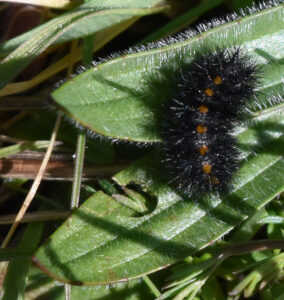Endangered Butterflies Return to Hornby Island

Bonnie Zand introduces Taylor’s Checkerspot caterpillars to their new home in Helliwell Provincial Park. Photo by Chris Junck.
There were a lot of smiles on March 11 and 17, as the Taylor’s Checkerspot Butterfly Recovery Project Team members and local community volunteers gently placed about 800 caterpillars in the meadows along the coastal bluffs of Helliwell Provincial Park on Hornby Island. The federally listed Endangered Taylor’s Checkerspot butterflies haven’t been seen in the park for more than two decades. Biologists feared that they were gone forever from Canada when they disappeared from the area in the mid-1990s. Fortunately, Taylor’s Checkerspot populations were discovered on Denman Island in 2005 and more recently near Campbell River. Those populations provided breeding stock for captive rearing programs, first on Denman Island and then at the Greater Vancouver Zoo.

Taylor’s Checkerspot caterpillar feeding on plantain. Photo by Chris Junck.
The caterpillar releases were the culmination of several years of planning, meadow habitat restoration efforts, and the butterfly breeding program. The success of the next stage of the project is mostly dependent on the tiny, hairy caterpillars. They must eat enough food, such as plantain, and transition through one or two more instar development stages before finding suitable safe locations to pupate. If all goes well, they will emerge as dazzling orange, black and white checkered butterflies in late April to early May.
One of the greatest threats to the caterpillars and their food plants is trampling. Park visitors and their pets can help reduce this risk by staying on the marked meadow trails delineated by ropes and restoration area signs. BC Parks staff wish to remind visitors that dogs must be on a leash according to provincial park regulations. Also, please do not move or pick up Taylor’s Checkerspots. Instead, report sightings to Taylors.Checkerspot@gov.bc.ca.

Jennifer Heron gently transfers caterpillars with a paintbrush. Photo by Chris Junck.
“It takes a lot of cooperation to bring butterflies back from the brink of extinction”, said Jennifer Heron, Chair of the Taylor’s Checkerspot Butterfly Recovery Project Team and invertebrate conservation specialist for the B.C. Ministry of Environment and Climate Change Strategy.
The Recovery Project Team includes representatives from the Greater Vancouver Zoo, BC Parks, Wildlife Preservation Canada, Garry Oak Ecosystems Recovery Team, Denman Conservancy Association, Mosaic Forests, consultants, and others. There has also been a lot of local help from volunteers, the Hornby Island Natural History Centre, Hornby Island Provincial Parks Committee and Conservancy Hornby Island. And of course a project like this requires significant financial support. In particular, the Recovery Project has benefited from the Environment Canada Habitat Stewardship Fund, the BC License Plate Fund and the Habitat Conservation Trust Foundation.
Although focused on Taylor’s Checkerspot, several other rare coastal bluff ecosystem species will benefit from this restoration work including Dun Skipper and about a dozen other range-restricted butterflies, Western Bumble Bee, many native plants, bats, Western Screech-Owl and numerous other birds.